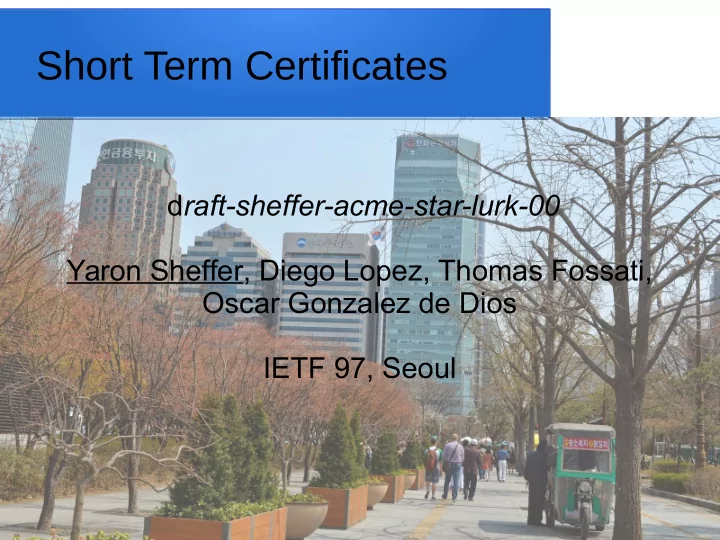

Short Term Certificates d raft-sheffer-acme-star-lurk-00 Yaron Sheffer, Diego Lopez, Thomas Fossati, Oscar Gonzalez de Dios IETF 97, Seoul
Motivation ● Delegate the authorization to publish a web site ● Securely: owner can revoke the authorization at any time ● And with no change to the client side (browser) ● Initial use case: CDN – Today, sites typically share their private key with the CDN
Background ● The problem space was explored in the LURK BoF ● An alternative: each TLS handshake is forwarded to a “box” that holds the private key and signs responses – Obvious engineering issues: performance and availability ● An earlier short-term certs protocol was proposed: draft-sheffer-lurk-cert-delegation – The current proposal is significantly different
Overview ACME Server - CA Domain Name Request Owner - DNO STAR Cert Request Periodically STAR Cert Retrieve Certificate LURK Client or CDN
Initial Setup ● Domain Name Owner (DNO) and CDN establish a mutually-authenticated channel ● DNO and CDN agree on a CSR template – This is the DNO’s policy: what domain names, cert validity period ● DNO registers with the ACME server
Bootstrap ● CDN generates a CSR based on the CSR template, sends it to DNO ● DNO validates that the CSR is in line with the template ● DNO sends the CSR to ACME server, requesting a Short- Term, Automatically Renewed ( STAR ) certificate ● ACME performs the usual checks, issues the certificate, sends back a STAR ID and a certificate URL – It is the DNO’s responsibility to respond to the issuance checks ● DNO responds to the CDN with the certificate URL ● CDN retrieves the (initial) short-term certificate
Certificate Refresh ● The ACME server periodically renews the certificate – E.g. every 3 days ● The ACME server posts the certificate and the CDN retrieves it
Revocation ● The DNO requests the ACME server to stop the automatic renewal process – Identified by the STAR ID ● ACME server stops issuing certificates ● No explicit X.509-style revocation
Security Considerations ● How do we prevent the CDN (or a rogue CDN employee) from passing the ACME checks? – E.g. https-01, when it can easily set up a web page ● A combination of security measures – Ensure the CDN does not own the relevant DNS zone – ACME servers MUST respect CAA records – Including draft-landau-acme-caa-01, to restrict ACME checks to DNS authorization only
Thank You!
Recommend
More recommend